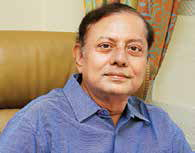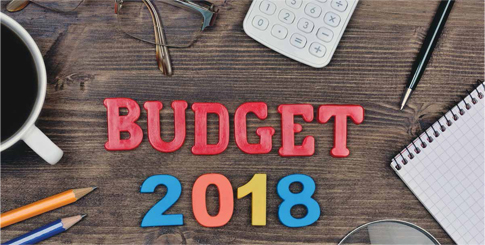It is the annual season of the Budget, with much discussion as to what it should and should not do, but little is known about what goes into its actual making. In very simple terms, it’s about telling your money where to go instead of wondering where it went, but with many constraints and challenges
Unlike the regular tax desk which is manned by a tax officer whose job is to levy tax on you, this desk is manned by a non-serving tax officer who wishes to share his experience of 35 years in the tax department, while, discussing tax provisions. It is advantageous to know how the tax department thinks and acts when, as said by Benjamin Franklin, “In this world nothing is certain except death and taxes”

The annual budget season has arrived. There are plenty of discussions and TV debates going on as to what the Finance Minister will do, or what he should do. There are also suggestions as to what he should not do.
The budget is an annual statement of estimate of income and expenditure for the country for the coming financial year. It projects the direction of the economy in the coming year while also giving accounts for the year which ends on 31st March. The making of the budget for the country is something like making a budget for our own home. It is something like telling your money where to go instead of wondering where it went. The key parameters of the national budget are: an insight of expenditure, priority areas of expenditure and estimate of income. The other considered component is limiting the extent up to which deficit financing can be done, if the income is not adequate. Since taxes are the main source of income, legislations on direct and indirect tax also become intrinsic parts of budget making. With the estimated income in mind, the Finance Minister goes to allocate funds for different sectors of the economy and to the needs as per the priority of the country.
For a country like ours, the biggest task in budget making is income generation when we have a very narrow tax-base. We need more money to help roughly one-third of our population that lives below the poverty line. We require more investment in the agriculture sector where almost 60% of our population is dependent on this sector and when farmers are committing suicide. We require more funds for welfare measures for our ever-growing population of about 130 crore people. Big money is always needed for the development of infrastructure and for creating avenues for employment generation. Making a budget when resources are limited and needed expenditure is very high, is a real difficult job. The million-dollar question before the Finance Minister is how and from where to generate income to meet our basic needs.

The issue of generation of income is something like a doctor’s dilemma, which a doctor faces when a serious patient is before him. The doctor faces two scenarios before him—the patient will die if the operation is not done on him, but he may also die if the operation is done on him. Similarly, the Finance Minister remains in two minds when the serious issue of income mobilisation is before him. He cannot squeeze the limited number of direct tax payers—which is less than 1% of our population—beyond a certain limit. The major proportion of our direct tax payers is made up of people who keep on facing hardship due to inflation and they cannot be forced to bear the burden of 99% of the population who do not pay tax.
In the area of indirect tax also, there is a limit to raising tax on goods and services. Increase in indirect tax will be bad for the economy, as it will fuel inflation. Secondly, indirect tax, being a regressive tax, affects the entire population, which comprises mainly of poor people and no government would like to hurt them. Corporate tax also cannot be increased arbitrarily as it will have a very bad effect on the business climate in the country and the same ultimately will affect the growth of our economy. In fact, there is a case for reducing the corporate tax rate when a big economy like the US has recently reduced it, and when we need to invite more FDI and increase the ease of doing business. The Finance Minister has to walk on a razor’s edge between the devil and deep sea while generating extra money for the country.
Money has to be generated for needful expenditure. To some extent, shortage of money for expenditure is met by the taxation policy through something like a barter system. Taxpayers are given tax incentives if they spend money in certain prescribed segments where it is the responsibility of the government to spend in those segments. For illustration, it is the duty of the government to invest in education and health sectors but due to the paucity of funds justice cannot be done to these areas. Tax policies in the budget each year incorporate such laws that if public charitable trusts invest money in these sectors, there will be no income tax on these charitable entities. Similar attempts of mutual benefit are also made in many areas like infrastructure, exports, welfare measures like employment generation, power sector, etc.
There was a time in the early '90s when our country did not even have reserves of foreign exchange for imports for more than 15 days. Foreign exchange is normally brought by exporters and hence to solve the precarious situation the budget passed during that time made export-income fully tax-exempt. Exporters got 100% tax benefit and the country got the needed foreign exchange, as tax-free export soared. Today, the urgency is in the sector of affordable housing and hence incentives are being provided year after year in each year’s budget.
Next comes the most arduous process of budget allocation to different sectors. The steps followed are identifying the required areas of expenditure, the amount of money actually needed and the actual amount that can be disbursed in view of the resources constraint. The process is simplified as each ministry makes a demand, giving details of their requirement before the budget making process starts. The Finance Ministry considers the demands in view of available resources and the priority areas of the government and the country, and then makes allocation of funds to the ministries.
While making allocation of funds to the different sectors, the Finance Ministry has to consider planned and unplanned expenditure together with capital and revenue parts of such expenditure. Necessary revenue expenditures, which cannot be ignored, are the interest burden for debt maintenance, salary, pension, including pension of armed forces, etc., and the same get top priority. Unfortunately, the necessary expenses are so heavy that net estimated income for allocation to different sectors and ministries after meeting them become small. The government has to also consider distribution of income to states and to create reserves for emergencies due to natural calamities.
Our country has consistently witnessed deficit financing over the years, which means that our expenditure is more than our income. In this context the two things which become important are the nature of borrowing to meet the expenditure and the predetermined quantum of proposed fiscal deficit. The deficit amount has to be kept low for fiscal prudence and for keeping inflation in check but at the same time a necessary expenditure on development work slightly in excess cannot be ignored.
"The making of the budget for the country is something like making a budget for our own home. It is something like telling your money where to go instead of wondering where it went. The key parameters of the national budget are: an insight of expenditure, priority areas of expenditure and estimate of income"
The preparation of the budget is done in utmost secrecy. The budget draft is completed about two weeks in advance before the date of its presentation in the Lok Sabha by the Finance Minister. The printing is done in secrecy by the printing press located in the basement of North Block, which also houses the office of the Ministry of Finance. The officers entrusted with the printing job along with their assistants stay in that basement till the budget day and they are not allowed to move out till then.
The process of going to the basement for printing the budget papers starts on a secret note, when, as per the historic ritual, halwa is prepared by the Finance Minister and his team for distribution amongst the officers and assistants. There is a belief that the preparation of the budget is very important work and hence the process of its printing must start on an auspicious note.
The one most important part of the budget preparation process is the proposed speech of the Finance Minister in the Parliament and hence the same along with the annexure are part and parcel of the budget documents. The process in the Parliament starts after tabling the budget documents after the speech by the Finance Minister. This process includes discussion on the various issues raised in the budget paper (Money Bill), amendments moved by the lawmakers and finally its passage.
The budget does not make everybody happy, as everybody does not get everything as per their wish list when resources are limited. Doing a budget means learning to say an ancient and powerful word, NO. It is a well-known fact that building wealth, whether for an individual or for a nation, is a marathon and not a sprint. Discipline is the key ingredient. Hence, please cheer this year’s budget, whatever it proposes.
by S. K. Jha